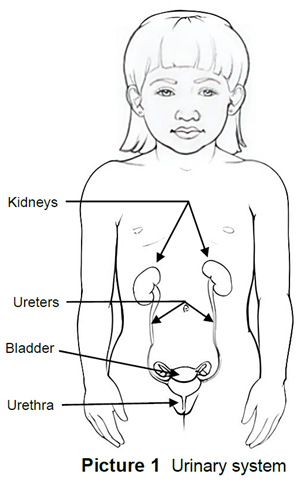Urinary Tract Infection: Prevention


The body gets rid of liquids that it doesn’t need through the urinary system (Picture 1).
Blood passes through the kidneys. The kidneys clean and filter waste products out of the blood. This liquid is now pee (urine). It flows down the ureters and into the bladder. When the body senses that the bladder is full, it pushes urine down the urethra and out of the body.
A urinary tract infection (UTI) happens when germs (bacteria) enter the urethra and grow. To keep the kidneys working well, it’s important to protect them from infection.
How to Prevent UTIs
To help prevent UTIs, your child needs to:
- Pee as soon as they have the urge to go. It’s not safe to hold in pee.
- Pee every 3 hours while they’re awake. After peeing, they should relax their body, count to 10, and see if they can pee a little more.
- Not hold in poop. This can cause them to hold in their pee too. If your child has constipation, talk to their doctor about ways to treat it.
- Drink plenty of liquids, especially water – 6 to 8 glasses each day.
- Keep their bottoms clean and dry. Put on clean underwear each day.
Tips for Children Born Female
Children born female need to take special care to prevent UTIs. They have a shorter urethra. Because of this, bacteria do not need to go as far to get into the bladder and grow. To help prevent a UTI, your child needs to:
- Wipe from front to back after peeing and/or pooping. This helps prevent bacteria in the poop from getting into the urethra.
- Wash their bottom if they soil or wet their underwear and/or pants. They should put on clean clothes right away.
- Wear underwear that’s made from cotton instead of synthetic fabric. Air flows through cotton more freely and keeps their bottom dry. Germs grow faster in a moist area than they do in a dry one.
- Change into dry clothes after swimming instead of staying in a wet suit.
Tips to Treat Irritation
Some things can irritate the skin where the pee comes out (the urethral opening). Your child can have pain, soreness, and tenderness when peeing and not have a UTI. To treat or prevent more irritation with or without a UTI:
- Avoid using bubble baths, detergents, shampoos, or shower gels in a bath.
- Avoid using colored or scented toilet paper.
When to Call the Doctor
Call your child’s doctor or health care provider if:
- Their pee turns red or a dark color.
- Their pee has a bad or strong smell.
- They have:
- Pain or difficulty peeing.
- Sudden or frequent need to pee.
- Pain in their lower back, right below the ribs, or belly (abdominal) pain.
- Chills or a fever over 101° Fahrenheit (F) or 38.3° Celsius (C) by mouth.
- Bed-wetting or accidents during the day after being potty trained.
Medicine
- If your child has a UTI, their doctor or health care provider will prescribe antibiotic medicine. They must take all the medicine as ordered, even after they start feeling better.
- When antibiotics are not used the right way, like taking too much, it can make infections very hard to treat with that medicine.
- Do not give your child expired medicine that has not been ordered for their UTI.
If you have any questions, ask your child’s doctor or health care provider.
HH-I-79 • ©1979, revised 2023 • Nationwide Children's Hospital


